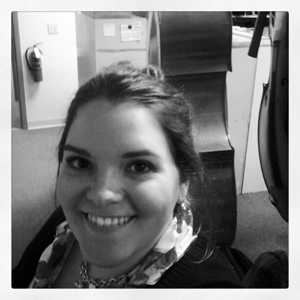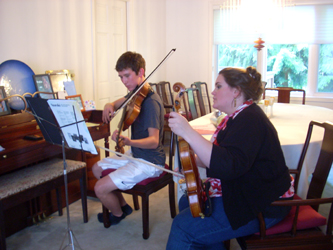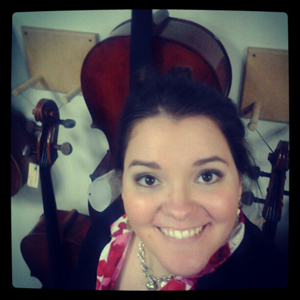In May of this year, we shared an article with our email subscribers titled "The Value of Music Degree." The article argued that a music degree, while it may not lead directly to a job, is still worth earning because of how much it can enrich one's life. The response was overwhelming: many musicians disagreed with the article and felt that their degree sent them out into a tough economy with few practical skills; others could not imagine their lives without their music degree, or without music at the center of their lives, no matter how tough it is to make a living as a musician. One of our readers, Susan Speicer, agreed to share her experience as a recent grad of Washington State University's School of Music. Even though Susan hasn't landed a symphony job (yet!), she's doing fine: she teaches and works at violin shop; she serves as an administrator for a youth symphony; she coaches and makes violin jewelry; and she writes a music blog. What we love about Susan, besides her obvious dedication to music, is her willingness to try out the different niches of a career in music, whether that's teaching, business, administration, or playing.
 There was a time, not two years ago, when I wondered if I would ever be done with my music degree. Then would come the anxiety that I would graduate, and not find any work in my field. For that last year of college, my entire world was music, and successfully finishing my degree.
There was a time, not two years ago, when I wondered if I would ever be done with my music degree. Then would come the anxiety that I would graduate, and not find any work in my field. For that last year of college, my entire world was music, and successfully finishing my degree.
Now, almost two years after graduating, some memories come through clearly, and others in a fuzz of stress, caffeine, and little to no sleep. One that comes through clearly is the summer of 2010, when my friends would all cram into one house and talk about our dreams, our dramas, and play Dance Dance Revolution until three in the morning. At the Washington State University School of Music, all of my friends had different goals. While we were all involved in music to some degree, we had very diverse expectations regarding music.
There isn’t one specific moment I can pin down, one moment when we all sat around and discussed what we planned to do after college. We talked about our dreams and hopes in between classes, outside of the practice rooms we all lived in, or on the way to grab a cup of coffee before attending a concert. Our hopes and dreams of lives in music were constantly with us, our most common and urgent topic of conversation, not something reserved for orderly classrooms. We all wanted our lives to be music, not just the pretty parts, but the difficult, the dull, and the horrible parts too.
Tina was going to the University of Michigan after the summer, to pursue her piano performance diploma. She struggled with hand and wrist injuries while preparing her audition CDs. Julianne was balancing a math degree and a music degree. Her parents wanted her to have a fallback plan in case music didn’t work out. Rebecca was done with her first year of grad school in violin performance, and getting ready to start auditioning. She had already gotten into two smaller professional orchestras, and was looking for bigger ones. Chelsea was one of the best violinists at the school, but had just switched her major from music to psychology. She still played, but the focus of her life was no longer solely music. As for me, I had one more year to go until I finished my Music Business degree. The mix of music and working with people is something I genuinely love. I had started out as neuroscience pre-Med in college, but had consistently given the best of my time and attention to music.
All of this is to say that I’m a professional musician. What does that mean exactly?  It means that I get the privilege of doing what I love - for pay. It also means that I have four official jobs and hundreds of tiny ones. I work at a violin shop, I teach, I coach, and I work administration. In all my free time I also write music blogs, make music themed jewelry, play occasional gigs, and try to see my family once in a while. Oh, and I also practice.
It means that I get the privilege of doing what I love - for pay. It also means that I have four official jobs and hundreds of tiny ones. I work at a violin shop, I teach, I coach, and I work administration. In all my free time I also write music blogs, make music themed jewelry, play occasional gigs, and try to see my family once in a while. Oh, and I also practice.
I’ve heard some professional musicians say that they did all their practicing in high school and college, and now they just work to keep their chops up. Personally, I’m trying to keep learning, keep improving, and keep trying to achieve more than I did last year. I try to take regular lessons with established professionals, and attend master classes to challenge myself.
Meanwhile, I work at a violin retailors, I teach a small studio of string players, I coach for local youth symphonies, and I work administration for one.
I have to admit that sometimes working for pay takes the pure joy out of what I do. Because I’m getting paid, sometimes I forget what an honor it is to play music for a living. I start wishing that I could have a job where I felt more secure, and didn’t have to constantly keep improving and competing. But honestly? That kind of job wouldn’t suit me at all. I’m nice, but I’m competitive down to my toes.
But being a professional musician doesn’t mean that I’m in a professional orchestra, preparing for concerts each week, or that I always get to play what I want. Maybe someday, after a few more auditions. And maybe never. I may never end up in a high paying professional orchestra.
But you know what?
I’m okay with that.
I never expected to be where I am now, playing music and making a living doing it. I certainly never expected to play in major orchestras. I think it would be amazing, and will work towards it, but if I never get there, I’ll still get somewhere better than where I am now. The people I went to Washington State University with are all doing different things with their degrees. Some people are fabulous public school music teachers. Other people got into professional orchestras right out of college. Some decided to start their own teaching studio. As for me, I’m not sure what the future holds for me and my music degree. Will I continue teaching? Will I work in music administration for a youth symphony? Or will I do something I haven’t encountered yet? I can’t answer these questions now, but I know that I chose the path that was right for me. I pursued music because I love it passionately, and have recently found that I am good at passing on that passion to students, and equally good at helping someone find the right instrument.
The people I went to Washington State University with are all doing different things with their degrees. Some people are fabulous public school music teachers. Other people got into professional orchestras right out of college. Some decided to start their own teaching studio. As for me, I’m not sure what the future holds for me and my music degree. Will I continue teaching? Will I work in music administration for a youth symphony? Or will I do something I haven’t encountered yet? I can’t answer these questions now, but I know that I chose the path that was right for me. I pursued music because I love it passionately, and have recently found that I am good at passing on that passion to students, and equally good at helping someone find the right instrument.
I feel incredibly lucky that I have jobs that allow me to further my musical education, and to explore what part of the music world I want to inhabit.
I was given some excellent advice by a professional musician of 15 years, and I would like to pass it on to you. It’s kind of a musician’s checklist, if you will.
1) Play in every community orchestra you can. Don’t worry about auditioning for big time symphonies yet. You want to impress the conductors and orchestra managers with your skill, attitude, and reliability. They will start to pass your name around to higher orchestras and recommend you for opportunities. In Seattle, for example, there is a list of musicians called first whenever they need musicians to record soundtracks for movies. The only way to get on this list is by multiple referrals.
2) Volunteer. Volunteer at Youth symphonies, volunteer at school music programs, volunteer at local musical theaters. Volunteer positions don’t always turn into paid jobs, but they will get your name out in a positive way.
3) Teach privately. Teaching privately is the most lucrative way to make money as a musician. You also get to hone your skills as you are teaching your students. Remember, fundamentals are what make you a great musician!
4) Network like Facebook was never invented. Do you know that person on your Facebook page, they one who played violin before switching to education? Maybe not? If you met them in person, you’d remember. My point is, make yourself known to people. Make sure all the local music stores know your face, what you play, if and what you teach, and maybe what your favorite color is too. I’ve gotten students from music shop referrals, I’ve gotten students from former teachers, and I’ve gotten students from the conductor’s I play under. Make sure that when one professional says your name to another, no one says, “Who?”
Following this list has helped me make the transition from recent graduate to professional musician.
Now as I look back at that summer two years ago, I see how far I have come. I have graduated college, gotten a job I love, started a teaching studio, and made valuable contacts in the music world. My friends have all made their marks too. Rebecca is playing violin with the Yakima Symphony Orchestra, Tina has received her performance diploma, Julianne just graduated from college and Chelsea is still studying psychology, but is also a counselor for the WSU Cougar Strings summer program.
I didn’t decide to become a musician. I decided to never quit learning about music. I didn’t choose my field, it snuck up on me. Now, doing all that I do, I still barely get by, but I’m one year out of school, and I’M GETTING BY! Its work and I know that it’s not everyone’s path. I certainly never thought it would be mine. In two years, it may no longer fit me. I might have different goals, different needs that my current jobs don’t meet. But for now, I get to wake up, go to work, and play music. And that’s good.


